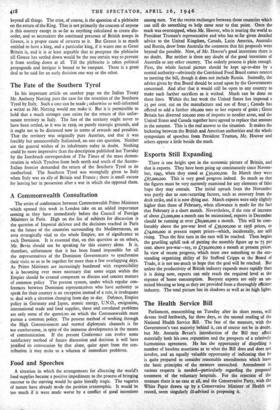Food and Speeches
A situation in which the arrangements for allocating the world's food supplies became a positive impediment to the process of bringing succour to the starving would be quite literally tragic. The vagaries of nature have already made the position catastrophic. It would be too much if it were made worse by a conflict of good intentions among men. Yet the recent exchanges between those countries which can still do something to help came near to that point. Once the mark was overstepped, when Mr. Hoover, who is touring the world as President Truman's representative and who has so far given detailed advice to the United Kingdom, Canada, Latin America, Australia and Russia, drew from Australia the comment that his proposals went beyond the possible. Now, of Mr. Hoover's good intentions there is no doubt. But neither is there any doubt of the good intentions of Australia or any other country. The orderly process is plain enough. First, the whole factual picture should be kept up-to-date by a central authority—obviously the Combined Food Board comes nearest to meeting the bill, though it does not include Russia. Secondly, the advice given by that Board should be acted upon by the Governments concerned. And after that it would still be open to any country to make such further sacrifices as it wished. Much can be done on these lines. Within the last week the United States has imposed a 25 per cent. cut on the manufacture and use of flour ; Canada has offered to add a further 15o,000 tons to her exports of grain ; Great Britain has diverted zoo,000 tons of imports to needier areas, and the United States and Canada together have agreed to replace that amount in the autumn. This is the real answer to the situation. It makes the bickering between the British and American authorities and the whole symposium of speeches from President Truman, Mr. Hoover and others appear a little beside the mark.


























 Previous page
Previous page